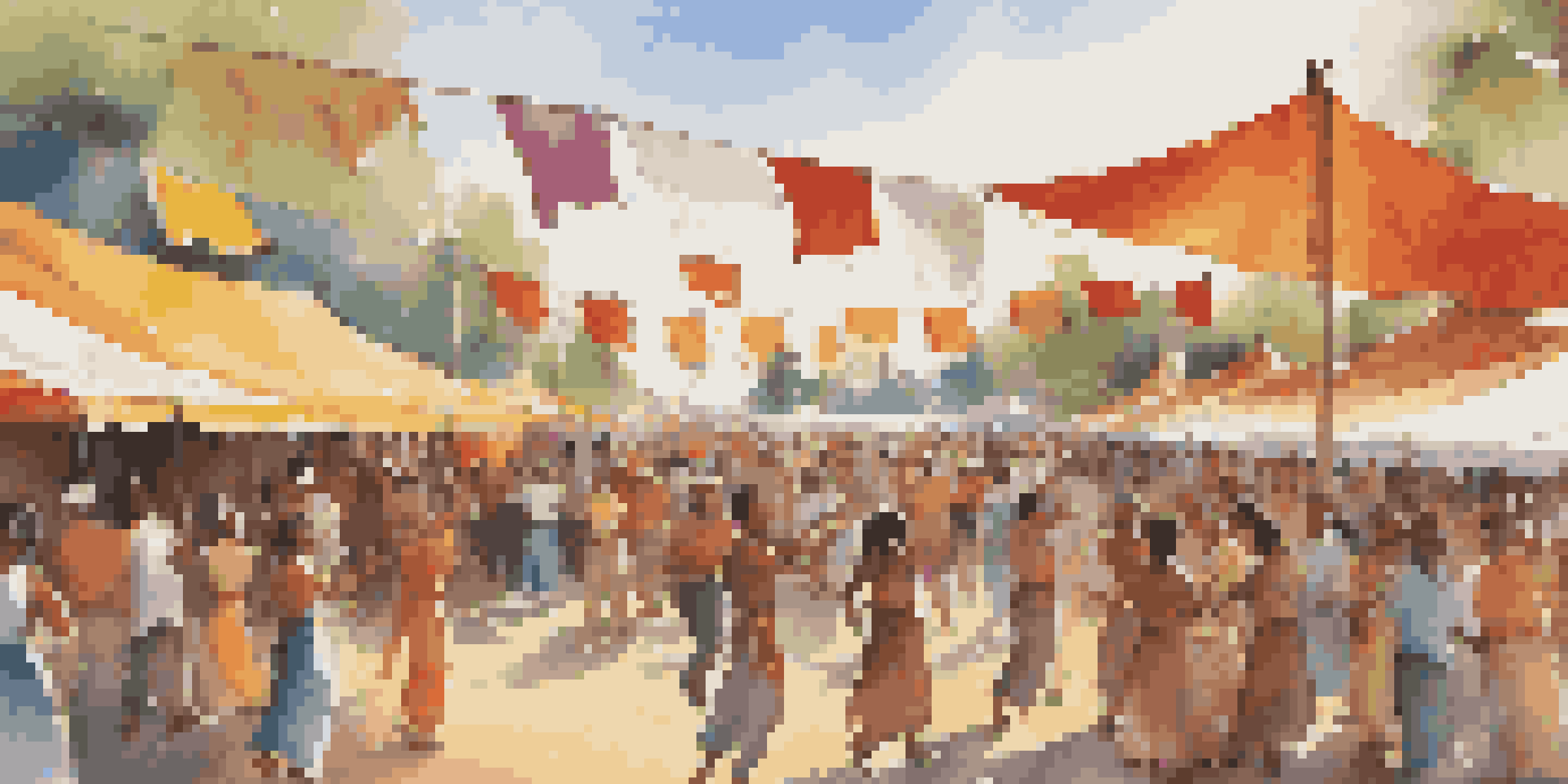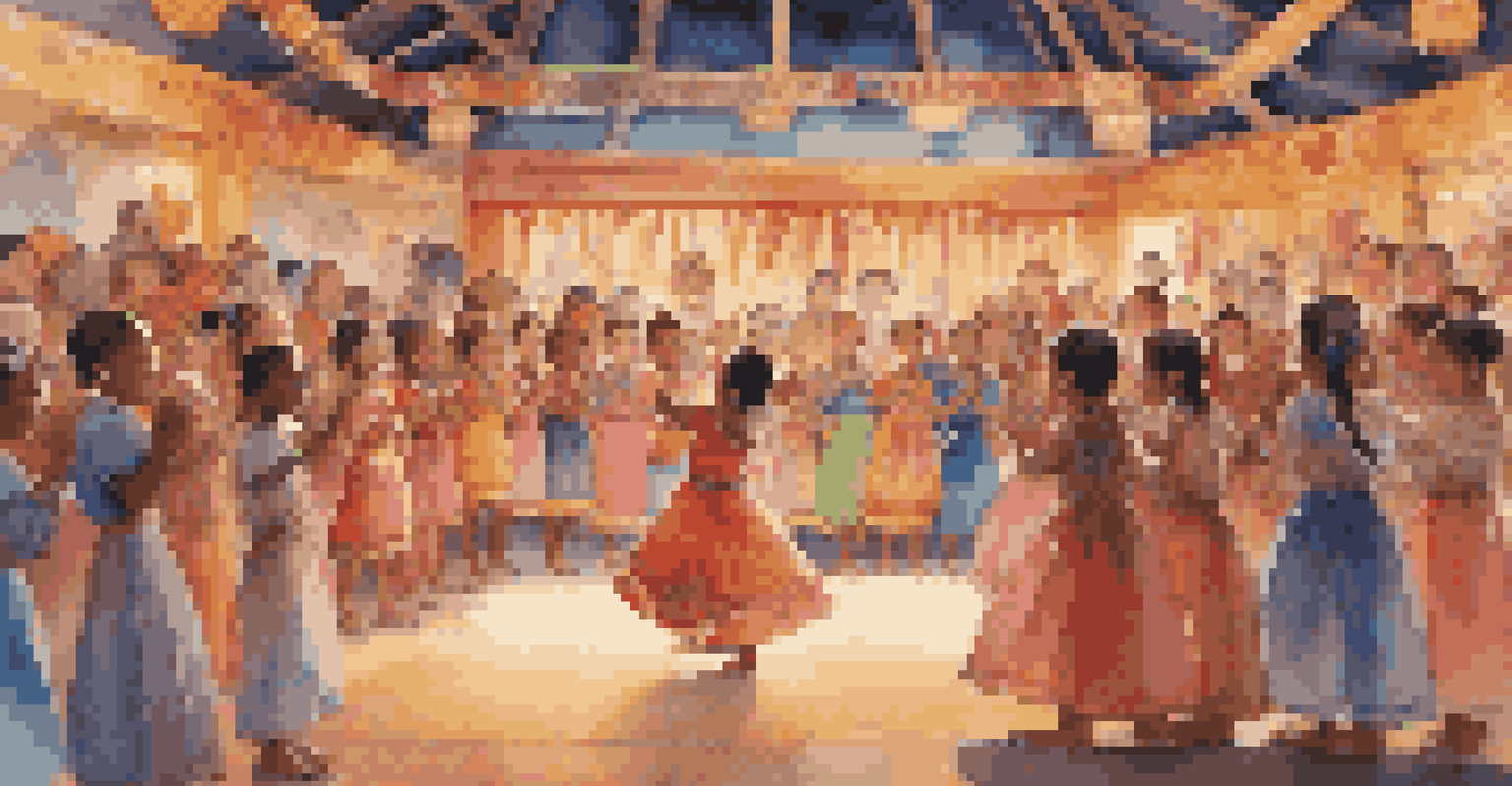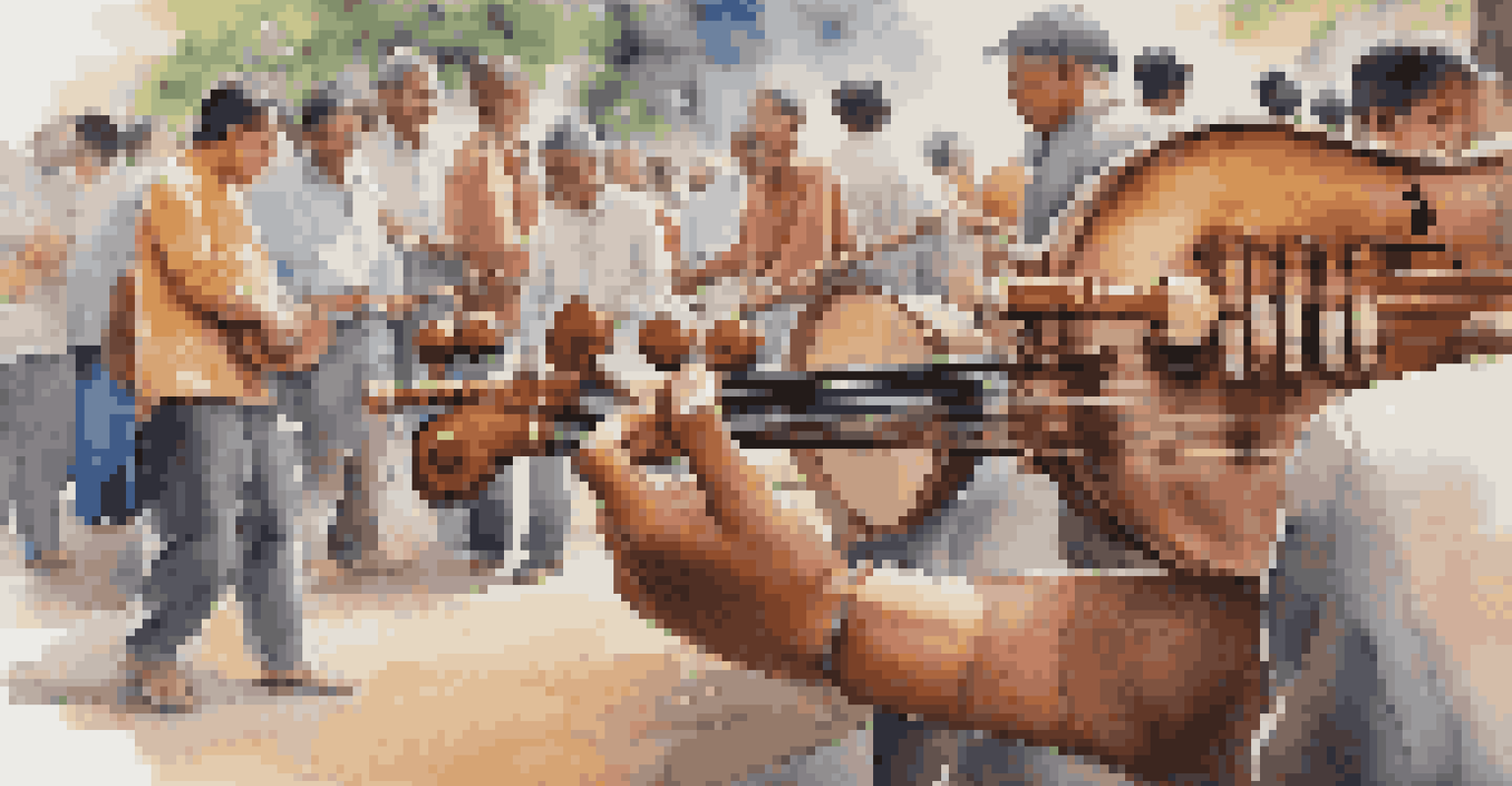Understanding the Role of Music in Cultural Festivals

The Importance of Music in Cultural Identity
Music serves as a powerful expression of cultural identity, encapsulating the values, traditions, and stories of a community. At cultural festivals, you'll often find music that resonates with the history and heritage of the people, creating a sense of belonging among attendees. For example, traditional folk songs can evoke memories and emotions that connect generations, reinforcing cultural pride.
Music can change the world because it can change people.
Moreover, music often acts as a bridge between different cultures, allowing for a rich exchange of ideas and practices. When diverse musical styles come together at a festival, it's not just about entertainment; it's about fostering understanding and appreciation among attendees. This mingling of sounds can lead to unique collaborations and new genres, enriching the cultural tapestry.
Ultimately, the music played at cultural festivals is not merely background noise; it's a vital thread that weaves the community's identity together. As people gather to celebrate their heritage, the melodies and rhythms they share become a living testament to their collective experience.
Creating a Sense of Community through Music
Cultural festivals are often marked by the communal experience of music, which fosters a sense of belonging among participants. When people come together to sing, dance, or simply enjoy live performances, they create bonds that transcend individual differences. This unity is especially palpable during group dances, where strangers become friends through shared rhythms.

In many cultures, music is a communal activity, inviting everyone to partake, whether through clapping, singing, or dancing. This participatory nature of musical experiences at festivals can break down barriers, allowing people from various backgrounds to connect on a deeper level. It’s a reminder that music has the power to bring people together, regardless of their origins.
Music Shapes Cultural Identity
Music acts as a vital expression of cultural identity, encapsulating the values and traditions of communities.
As attendees engage with music, they often share stories and experiences, further strengthening their sense of community. The collective enjoyment of music at festivals not only uplifts spirits but also reinforces social ties, creating lasting memories that participants carry long after the event has ended.
Music as a Tool for Cultural Preservation
Cultural festivals often serve as important venues for preserving and promoting traditional music. Many communities use these events to showcase their musical heritage, ensuring that ancient songs and instruments are passed down to future generations. This preservation effort is crucial in our rapidly changing world, where globalization can threaten local traditions.
Without music, life would be a mistake.
By incorporating workshops and performances focused on traditional music, festivals educate attendees about their cultural roots. Participants may learn about the significance of certain instruments or the stories behind specific songs, fostering a deeper appreciation for their heritage. This educational aspect enriches the festival experience and encourages cultural stewardship.
Furthermore, the revival of traditional music at festivals can spark a renewed interest among younger generations. When young people see their elders performing, it can inspire them to learn these musical forms, ensuring continuity in cultural practices. In this way, music becomes a living archive of a community's history and values.
The Economic Impact of Music at Festivals
Music plays a pivotal role in the economic success of cultural festivals, attracting attendees and generating revenue. Many festivals curate diverse lineups featuring popular local and international artists, drawing in crowds eager to experience the performances. This influx of visitors can significantly boost local businesses, from food vendors to hotel accommodations.
Moreover, the presence of music-related events can extend the duration of festivals, encouraging visitors to explore the area and engage with its offerings. Interactive music workshops, for instance, can keep attendees around longer, enhancing their overall experience while also benefiting the local economy. Everyone from artisans to restaurateurs often sees the positive impact of increased foot traffic during these events.
Fostering Community Through Music
Cultural festivals promote a sense of belonging by bringing people together to share musical experiences.
In addition to immediate economic benefits, music festivals can foster long-term tourism. A successful festival can become a signature event for a region, drawing repeat visitors year after year. This sustained interest can transform a local cultural festival into a significant tourism attraction, amplifying its economic impact.
Music as a Form of Expression and Protest
Throughout history, music has been a powerful medium for expressing social and political sentiments, especially during cultural festivals. Artists often use their platforms to address issues such as inequality, injustice, and cultural identity, resonating with audiences on a profound level. For example, protest songs at festivals can galvanize communities and inspire them to take action.
These musical expressions can also serve as a form of healing, allowing individuals and communities to process collective grief or trauma. Festivals provide a space for artists to share their stories through music, creating an atmosphere of solidarity and support. This cathartic experience can be transformative for both performers and attendees.
Additionally, music at cultural festivals often reflects broader movements for change, amplifying voices that might otherwise go unheard. By showcasing diverse perspectives, festivals can play a critical role in promoting dialogue around important social issues, using music as a catalyst for change.
The Diversity of Musical Genres at Festivals
Cultural festivals typically feature a rich variety of musical genres, showcasing the diverse sounds that reflect the community's heritage. From traditional folk music to contemporary fusion styles, these events highlight the evolving nature of cultural expression. This diversity not only entertains but also educates attendees about the various musical traditions present in a region.
Moreover, the blending of genres at festivals often leads to innovative collaborations that create new musical experiences. For instance, a jazz musician might join forces with a traditional folk artist, resulting in a unique performance that bridges cultural gaps. These unexpected combinations can breathe new life into established genres, encouraging creativity and experimentation.
Economic Boost from Music Festivals
Music festivals significantly enhance local economies by attracting visitors and encouraging longer stays.
Attendees at cultural festivals benefit from this musical diversity, as they have the opportunity to discover new artists and sounds. This exposure can broaden their musical tastes and deepen their appreciation for different cultures, fostering a more inclusive understanding of global music traditions.
The Role of Technology in Musical Experiences at Festivals
With the advent of technology, the musical experience at cultural festivals has transformed in exciting ways. From high-quality sound systems to innovative stage designs, technology enhances the overall experience for both performers and attendees. This integration ensures that every note is heard clearly and every performance is visually captivating.
Additionally, technology has made it easier for festival organizers to reach wider audiences through livestreaming and social media platforms. People unable to attend in person can still experience the magic of the festival from the comfort of their homes. This accessibility allows more individuals to engage with the music and culture on display, expanding the festival's reach.

Lastly, technology has also paved the way for interactive experiences, such as virtual reality (VR) performances or music apps that allow attendees to connect with artists. These innovations not only enrich the festival experience but also create new avenues for artists to share their work and engage with fans, bridging the gap between tradition and modernity.